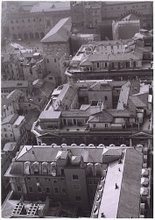ASHER YATSAR, Mishkan T'filah
Rachel Naomi Remen tells a beautiful story of learning about blessings from her grandfather. He tells her the story of Jacob’s struggle at Peniel, when he wrestles with a messenger. Remen’s grandfather describes the encounter between Jacob and the angel, telling her that Jacob’s leg was hurt in the struggle, and that before the angel left, he touched Jaocb on the place where it hurt. Remen recalls that as a child, “This was something I could understand, often my mother did this, too. ‘To help it getter better, Grandpa?’ I asked. But my grandfather shook his head. ‘I do not think so, Neshume-le. He touched it to remind Jacob of it. Jacob carried it all the rest of his life. It was his place of remembering.’” He leaves her with the idea that confusing an angel with an enemy isn’t the most important part of the story. Instead, the most important message is that everything has its blessing.
Remen reflects on this later in life, as she struggles with disease and pain, and finds meaning in it that struck me as I read the settings of Asher Yatzar. In response to the Jacob story she concludes, “It is a puzzling story, a story about the nature of blessings and the nature of enemies. How tempting to let the enemy go and flee. To put the struggle behind you as quickly as possible and get on with your life. Life might be easier then but far less genuine. Perhaps the wisdom lies in engaging the life you have been given as fully and courageously as possible and not letting go until you find the unknown blessing that is in everything.”
I have been fortunate to have been healthy and significantly pain free for most of my life. Yet I encounter theologians, mystics, physicians, congregants and friends who have struggled with illness, or with bodies that fail when the mind is strong, and have found such deep courage, strength, and meaningful connections to the Divine through this process. And I often find myself questioning my ability to have a similar deep relationship with God without having gone through such a struggle. I am particularly struck when I read the line, “were one of them to fail – how well we are aware!” we would lack the strength to stand before you.” As clergy, I am aware of this empirically, but not with first hand knowledge. Yet, why then, do I find myself reciting this daily blessing of real appreciation and gratitude – not only for my own continued health, but for the miracle that is the human body?
Some days – the second selection calls to me. I fear those moments of weakness; I know that failures of systems or health are inevitable in all our lives. So I find myself deeply responding to this idea, that though “I have asked for so much”, please God, don’t let me feel the pain and the defeat.
Years ago, I wrote a paper on the theologies of illness and healing for a class with Dr. Eugene Borowitz. Writing the paper reminded me of an old Judging Amy episode, in which Amy’s close friend is in remission from cancer, and tells Amy that she has found God. Amy is incredulous, seeing as her friend was the most “intelligent and rational” person she knows. Amy asks her friend, laughingly, “You don’t really think God cured you, do you?” The friend responded, “No. The medicine and hospital care cured me. But God was there.”
I’m challenged by this idea because the idea of “finding God” in a moment of distress sounds the alarm of “religion” and “fundamentalism”. However, when Amy says to another co-worker, “Can you believe it – my friend found God?” He replied, “I didn’t know He was lost.” I remember being caught off-guard by this. Maybe it’s less about finding God, as being able to take a look at your life in such a way that you notice that God was there all along. Like Jacob, as I have struggled with my faith, though I’ve doubted my ability to “find faith” if I am not ill, my search has led me to recognize the faith that might have been there, bamakom hazeh, in this place, all along.
Rosalie Boxt is the cantor of Temple Emanuel of Kensington, MD.
For more information about Mishkan T'filah, visit urj.org/mishkan.
skip to main |
skip to sidebar

There are protesters below. They were funny.

the galapagos. seriously, it is awesome.
Miscellaneous thoughts, often in the middle of the night (when I have most of my energy).
Old Europe from a leaning tower (not the...)

There are protesters below. They were funny.
Take it to five!
Movies to see
Brilliant TV series
Entertaining Sites to Visit
- Craigslist Underground
- Your Contract Lawyer
- Laura the Explorer
- MyGeorgetownMD
- Life in Chicago
- International Business Consulting
- Cool tees
- Furnished temporary apartments in Buenos Aires
- Hawaiian Lei website
- The Uncyclopedia
- Democratic Courage Blog
- Make your own crossword puzzle
- http://www.shabot6000.com/
- Generate your own church sign
- Marion Barry Quotes
- http://www.petiteanglaise.com/
- Random Confession Site
Nap Time

the galapagos. seriously, it is awesome.
Blog Archive
-
▼
2008
(104)
-
▼
July
(27)
- Amazon
- cabs (redux)
- Review of Blue Velvet
- Frustration
- Spiderman
- Blah...
- Temper
- Newark
- Passing out - intentionally
- And the weirdness continues....
- In case you were wondering...
- Internet Weirdness
- 10 minutes of Torah
- Sleepy time bear
- Did I inadvertently move to Akron Ohio?
- Paper bags as garbage bags
- Passwords
- Gmail google ads
- More comments from friends
- Headaches
- Wes Anderson
- Food Shopping
- Fat
- Garbage
- Discourse
- Night of nonsense
- Inspirational (sort of) Friday
-
▼
July
(27)




